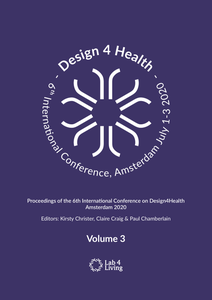The concept of Smart Healthy Age-Friendly Environments (SHAFE) emphasises the comprehensive person-centred experience as essential to promoting living environments. SHAFE takes an interdisciplinary approach, conceptualising complete and multidisciplinary solutions for an inclusive society. From this approach, we promote participation, health, and well-being experiences by finding the best possible combinations of social, physical, and digital solutions in the community. This initiative emerged bottom-up in Europe from the dream and conviction that innovation can improve health equity, foster caring communities, and sustainable development. Smart, adaptable, and inclusive solutions can promote and support independence and autonomy throughout the lifespan, regardless of age, gender, disabilities, cultural differences, and personal choices, as well as promote happier and fairer living places.

The demand for the transport of goods within the city is rising and with that the number of vans driving around. This has adverse effects on air quality, noise, safety and liveability in the city. LEFVs (Light Electric Freight Vehicles) offer a potential solution for this. There is already a lot of enthusiasm for the LEFVs and several companies have started offering the vehicles. Still many companies are hesitating to start and experience. New knowledge is needed of logistics concepts for the application of LEFVs. This paper shows the outcomes of eight case studies about what is needed to successfully deploy LEFVs for city logistics.

Challenging behaviour, such as aggression towards oneself, others, or objects, arises in interaction with the environment and may prevent individuals from participating in society and compromise their quality of life (QoL). Literature suggests that architects can contribute to prevention, by influencing challenging behaviour before rather than after its occurrence. By conducting a case study at a very-intensive-care facility, we explore how architecture can contribute to the QoL of intellectually impaired (and autistic) individuals showing challenging behaviour. The case study is based on interviews with residents and care providers, and direct observations of their daily life. Preliminary findings confirm the relevance of architecture in influencing challenging behaviour. They suggest that the residents are dependent on the (visual and auditory) connection with the care provider. Also, care providers confirm the importance of this connection for the quality of the care they provide. At the same time, residents may experience anxiety triggered by fellow residents and their challenging behaviour. Residents may also feel stress when faced with unexpected situations and this may lead to an onset of challenging behaviour. Sensory sensitivity, specifically to noise and heat is also relevant for their QoL.The findings will be further substantiated through multiple triangulation with available data (personal files, incident reports, photographs). Future research, specifically focused on intellectually impaired individuals showing challenging behaviour, is needed to better understand the similarities and differences between their needs and the needs of autistic people.
MULTIFILE

Client: ERA-NET Cofund Smart Cities and Communities, JPI Urban EuropeUrban tourism generates income for cities and create opportunities for its businesses and employment for its residents. However, it can also lead to overcrowding, pollution, noise and numerous other problems, thus reducing quality of life for residents and other local stakeholders and potentially leading to public discontent. This project introduces SCITHOS as a concept that consists of guidelines and tools to help cities find solutions to make the transition towards environmentally and socially responsible urban tourism that simultaneously contributes to long-term prosperity.Within SCTHOS this is done by combining hospitality principles, simulation tools, apps and serious gaming techniques to support policymakers and other stakeholders in generating collaborative deep reflections about barriers to sustainable urban tourism and the need for transition or adaptation strategies. The project supports the assessment of intervention strategies based on an interactive simulation-supported multi-stakeholder approach that triggers social learning and behavior change, while stimulating shared governance and smart citizenship.Guidelines/ tools and the full concept are developed through a series of living labs and field experiments in participating cities. What is more, a Smart City Hospitality network is set up to ensure accessibility to this concept, including all tools and experiences with using them. The final results of the projects are presented 10 and 11 September 2019 in Vienna, as a pre-session to the popular annual Tourism conference (TOURMIS).